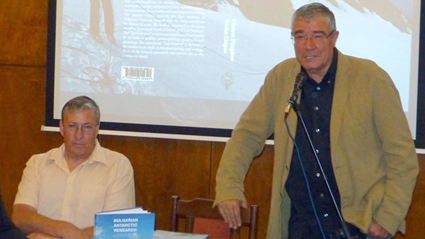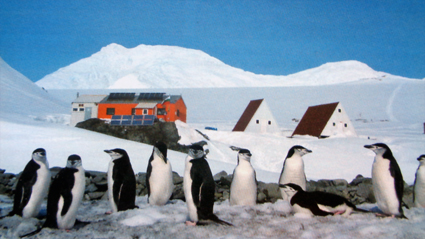On 23 June St. Kliment Ohridski University of Sofia played host to the premiere of the volume Bulgarian Antarctic Research, a Synthesis. The cover page of the book displays the names of two professors – Christo Pimpirev and Nesho Chipev. The English language edition presents previously unpublished findings of science research held over the past 25 years in the region of the Bulgarian base in Livingston Island. This country has strong experience in the exploration of the icy continent. The pioneer of the Bulgarian Antarctic program and leader of annual research expeditions to that place is geologist Prof. Christo Pimpirev. Research is mostly focused on Earth sciences and biology.
 „Antarctica is very rich in mineral resources and given that our territory there is part of Bulgaria we have to be aware of what we have in the country but also in the Hurd Peninsula where the Bulgarian base is located”, he told Radio Bulgaria. “The reason why is that these resources will necessarily be exploited in the future because there is a moratorium on their use operational until 2040. In the sphere of biology we explore the entire unique animal and plant world in Antarctica. It is endemic, with a variety of species that live only there because the climate is specific. Our penguin research for example suggests that their feathers have high heavy metal content. This means that global pollution has reached as far as this cleanest of continents. Research efforts have been focused on global climate change which already affects the lives of all of us.”
„Antarctica is very rich in mineral resources and given that our territory there is part of Bulgaria we have to be aware of what we have in the country but also in the Hurd Peninsula where the Bulgarian base is located”, he told Radio Bulgaria. “The reason why is that these resources will necessarily be exploited in the future because there is a moratorium on their use operational until 2040. In the sphere of biology we explore the entire unique animal and plant world in Antarctica. It is endemic, with a variety of species that live only there because the climate is specific. Our penguin research for example suggests that their feathers have high heavy metal content. This means that global pollution has reached as far as this cleanest of continents. Research efforts have been focused on global climate change which already affects the lives of all of us.”
Christo Pimpirev contends that Antarctica is a litmus test for the Earth’s climate. This is clearly demonstrated in the work of Bulgarian scientists and their colleagues from a handful of countries.
„Our findings suggest that Antarctica has seen a tangible climate warming with huge parts of shelf glaciers breaking away and heading south to later melt down. Humidity is growing, and rainfalls too. This has inevitably affected the plant and animal world. The number of penguins for instance whose lives are dependent on ice has considerably decreased. In contrast, the populations of other kinds of penguins who live in no-ice areas have increased. This research is relevant for the whole planet.”
 Prof. Nesho Chipev, a biologist and ecologist, has been to the icy continent six times. There Bulgarian scientists have studied the bio diversity of Livingston Island, the ocean and the adaptation of organisms in that eco-system. In this way about 120 studies have been written for a period of 25 years. What is more, Bulgarian researchers have discovered seven new species – both plants and animals. What makes the preservation of Antarctica’s living resources so important?
Prof. Nesho Chipev, a biologist and ecologist, has been to the icy continent six times. There Bulgarian scientists have studied the bio diversity of Livingston Island, the ocean and the adaptation of organisms in that eco-system. In this way about 120 studies have been written for a period of 25 years. What is more, Bulgarian researchers have discovered seven new species – both plants and animals. What makes the preservation of Antarctica’s living resources so important?
„The resources have to be preserved for a very important reason: there is no major human presence in Antarctica as yet; it has had no human population so far”, Nesho Chipev explains. “And this makes it a natural laboratory that is telltale about the processes underway on the planet. This laboratory enables us to carry out forecasts on what would happen as a result of intensified human activity in one direction or another. Besides, a new and quite big eco-system has been found there. It is the cryosphere and this is life on icy surfaces above and beneath water. The disappearance of species has been reported more often today. We live in a period like the one at the end of the Mesozoic Era when dinosaurs went extinct.”
According to Nesho Chipev the clean air, the clean water and the fertile soil are givens that natural eco-systems deliver to man free of charge. For this reason we must preserve them at any cost.
English version: Daniela Konstantinova
Photos: Bulgarian Antarctic Institute and Veneta Pavlova
Exactly 3 years ago, on February 24, Russia’s invasion of Ukraine began – an event that woke up Europe 77 years after the end of World War II and called into question one of the main goals of the EU – preventing a new armed conflict on the continent...
The festive service for the consecration of the new Bulgarian Orthodox church in London is led by His Holiness Daniil , Patriarch of Bulgaria, who also officiated at the Ressurection Vespers on Saturday. Hundreds of lay people-official guests and..
The Martenitsa Festival was held in Brussels f or the third consecutive year . Cultural organizations from Bulgaria, Romania and Moldova presented their country's traditions related to the "Baba Marta" holiday, which heralds spring. The initiative..
Exactly 3 years ago, on February 24, Russia’s invasion of Ukraine began – an event that woke up Europe 77 years after the end of World War II and called..

+359 2 9336 661
